Exploring Mental Health Nursing Theories and Patient Outcomes
VerifiedAdded on 2023/03/20
|14
|3613
|32
Report
AI Summary
This report explores the application of various nursing theories in the context of mental health care. It begins by defining mental health issues and the challenges associated with treating them, emphasizing the need for effective nursing theories. The report then presents a case study of a 45-year-old man, Sean McMurray, who is admitted to a psychiatric ward, and uses this case to illustrate the practical application of the Recovery Oriented Nursing care model. The report highlights the principles of this model, including individual uniqueness, real choices, attitudes and rights, dignity and respect, and partnership and communication. Furthermore, it discusses the Tidal Model, a mental health recovery model that emphasizes individual empowerment and self-discovery, and Peplau's Theory, focusing on the nurse-patient relationship. The report explains the key philosophical assumptions of the Tidal Model and the four stages of Peplau's Theory, demonstrating how these theories can be used to improve patient outcomes and promote holistic health. The assignment underscores the importance of nurses developing strong emotional bonds with patients and providing them with autonomy, empathy, and support to overcome mental health challenges.
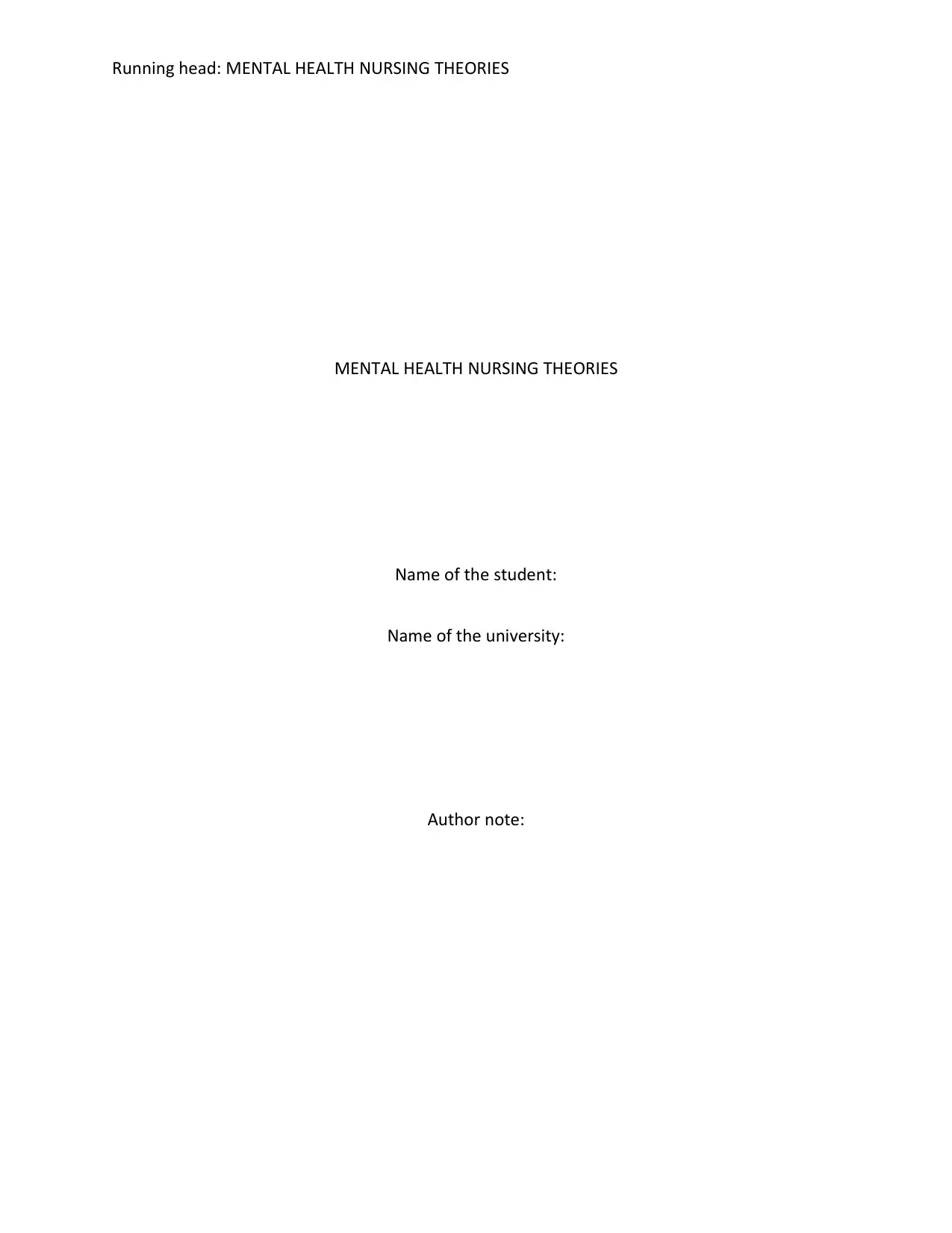
Running head: MENTAL HEALTH NURSING THEORIES
MENTAL HEALTH NURSING THEORIES
Name of the student:
Name of the university:
Author note:
MENTAL HEALTH NURSING THEORIES
Name of the student:
Name of the university:
Author note:
Paraphrase This Document
Need a fresh take? Get an instant paraphrase of this document with our AI Paraphraser
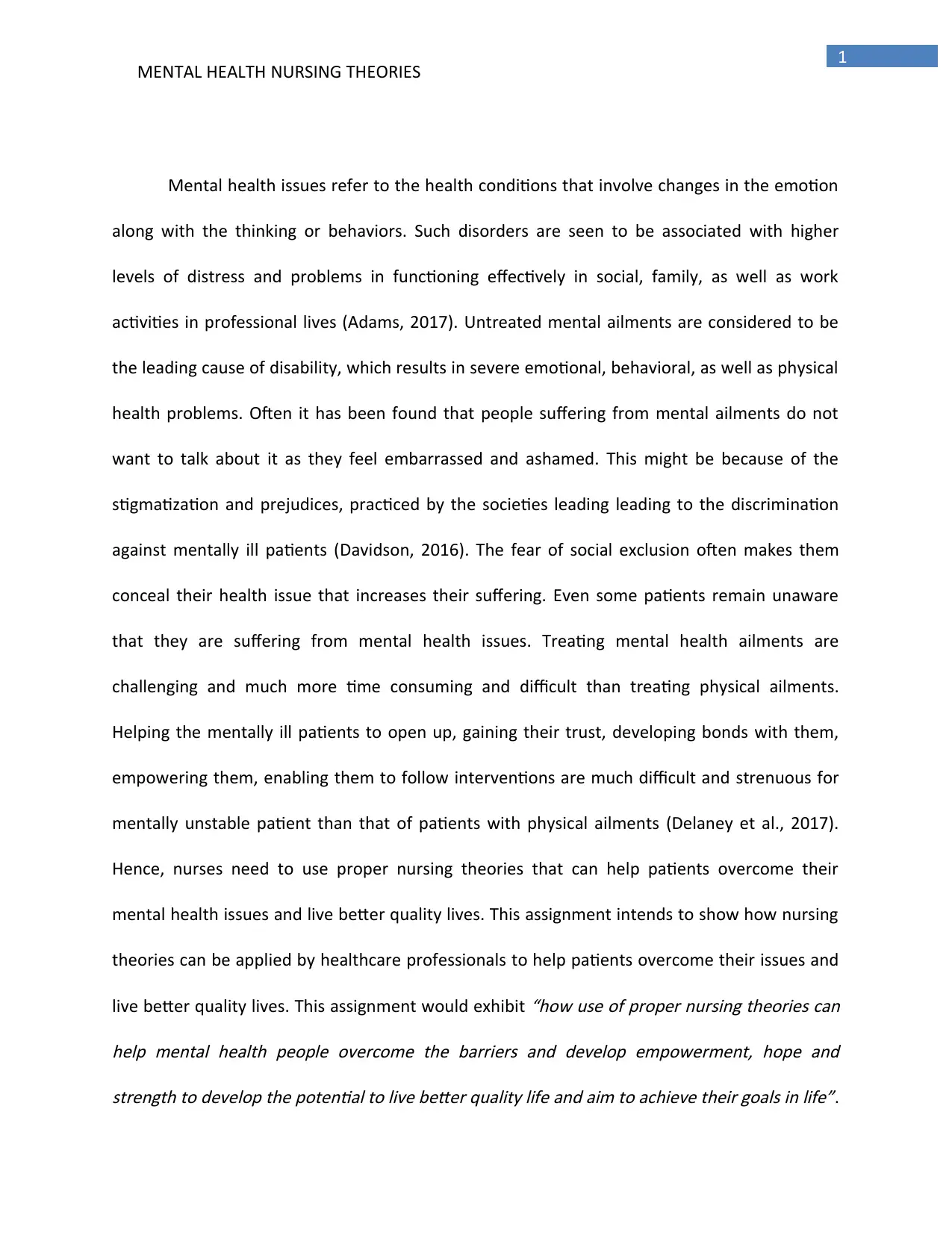
1
MENTAL HEALTH NURSING THEORIES
Mental health issues refer to the health conditions that involve changes in the emotion
along with the thinking or behaviors. Such disorders are seen to be associated with higher
levels of distress and problems in functioning effectively in social, family, as well as work
activities in professional lives (Adams, 2017). Untreated mental ailments are considered to be
the leading cause of disability, which results in severe emotional, behavioral, as well as physical
health problems. Often it has been found that people suffering from mental ailments do not
want to talk about it as they feel embarrassed and ashamed. This might be because of the
stigmatization and prejudices, practiced by the societies leading leading to the discrimination
against mentally ill patients (Davidson, 2016). The fear of social exclusion often makes them
conceal their health issue that increases their suffering. Even some patients remain unaware
that they are suffering from mental health issues. Treating mental health ailments are
challenging and much more time consuming and difficult than treating physical ailments.
Helping the mentally ill patients to open up, gaining their trust, developing bonds with them,
empowering them, enabling them to follow interventions are much difficult and strenuous for
mentally unstable patient than that of patients with physical ailments (Delaney et al., 2017).
Hence, nurses need to use proper nursing theories that can help patients overcome their
mental health issues and live better quality lives. This assignment intends to show how nursing
theories can be applied by healthcare professionals to help patients overcome their issues and
live better quality lives. This assignment would exhibit
“how use of proper nursing theories can
help mental health people overcome the barriers and develop empowerment, hope and
strength to develop the potential to live better quality life and aim to achieve their goals in life”.
MENTAL HEALTH NURSING THEORIES
Mental health issues refer to the health conditions that involve changes in the emotion
along with the thinking or behaviors. Such disorders are seen to be associated with higher
levels of distress and problems in functioning effectively in social, family, as well as work
activities in professional lives (Adams, 2017). Untreated mental ailments are considered to be
the leading cause of disability, which results in severe emotional, behavioral, as well as physical
health problems. Often it has been found that people suffering from mental ailments do not
want to talk about it as they feel embarrassed and ashamed. This might be because of the
stigmatization and prejudices, practiced by the societies leading leading to the discrimination
against mentally ill patients (Davidson, 2016). The fear of social exclusion often makes them
conceal their health issue that increases their suffering. Even some patients remain unaware
that they are suffering from mental health issues. Treating mental health ailments are
challenging and much more time consuming and difficult than treating physical ailments.
Helping the mentally ill patients to open up, gaining their trust, developing bonds with them,
empowering them, enabling them to follow interventions are much difficult and strenuous for
mentally unstable patient than that of patients with physical ailments (Delaney et al., 2017).
Hence, nurses need to use proper nursing theories that can help patients overcome their
mental health issues and live better quality lives. This assignment intends to show how nursing
theories can be applied by healthcare professionals to help patients overcome their issues and
live better quality lives. This assignment would exhibit
“how use of proper nursing theories can
help mental health people overcome the barriers and develop empowerment, hope and
strength to develop the potential to live better quality life and aim to achieve their goals in life”.
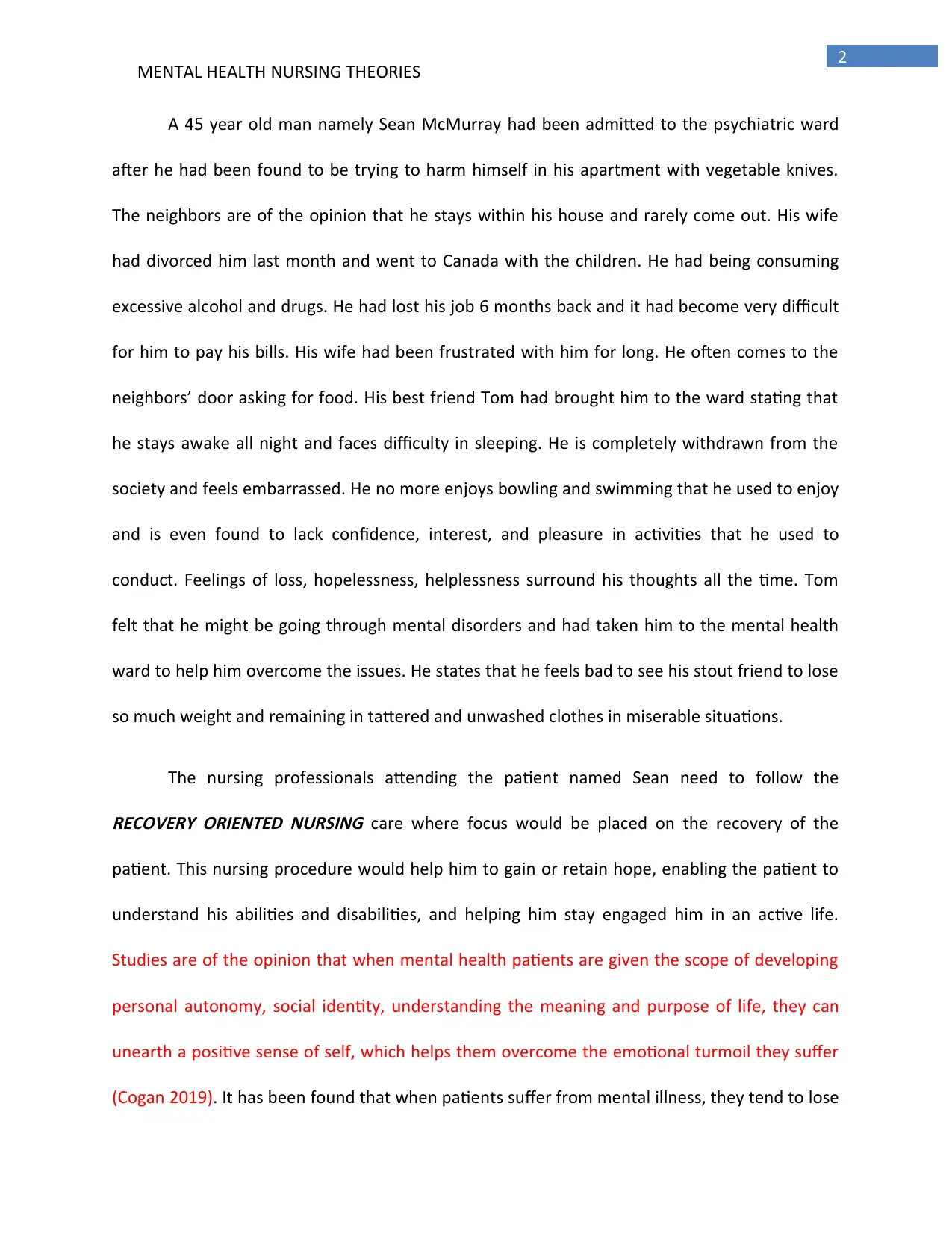
2
MENTAL HEALTH NURSING THEORIES
A 45 year old man namely Sean McMurray had been admitted to the psychiatric ward
after he had been found to be trying to harm himself in his apartment with vegetable knives.
The neighbors are of the opinion that he stays within his house and rarely come out. His wife
had divorced him last month and went to Canada with the children. He had being consuming
excessive alcohol and drugs. He had lost his job 6 months back and it had become very difficult
for him to pay his bills. His wife had been frustrated with him for long. He often comes to the
neighbors’ door asking for food. His best friend Tom had brought him to the ward stating that
he stays awake all night and faces difficulty in sleeping. He is completely withdrawn from the
society and feels embarrassed. He no more enjoys bowling and swimming that he used to enjoy
and is even found to lack confidence, interest, and pleasure in activities that he used to
conduct. Feelings of loss, hopelessness, helplessness surround his thoughts all the time. Tom
felt that he might be going through mental disorders and had taken him to the mental health
ward to help him overcome the issues. He states that he feels bad to see his stout friend to lose
so much weight and remaining in tattered and unwashed clothes in miserable situations.
The nursing professionals attending the patient named Sean need to follow the
RECOVERY ORIENTED NURSING care where focus would be placed on the recovery of the
patient. This nursing procedure would help him to gain or retain hope, enabling the patient to
understand his abilities and disabilities, and helping him stay engaged him in an active life.
Studies are of the opinion that when mental health patients are given the scope of developing
personal autonomy, social identity, understanding the meaning and purpose of life, they can
unearth a positive sense of self, which helps them overcome the emotional turmoil they suffer
(Cogan 2019). It has been found that when patients suffer from mental illness, they tend to lose
MENTAL HEALTH NURSING THEORIES
A 45 year old man namely Sean McMurray had been admitted to the psychiatric ward
after he had been found to be trying to harm himself in his apartment with vegetable knives.
The neighbors are of the opinion that he stays within his house and rarely come out. His wife
had divorced him last month and went to Canada with the children. He had being consuming
excessive alcohol and drugs. He had lost his job 6 months back and it had become very difficult
for him to pay his bills. His wife had been frustrated with him for long. He often comes to the
neighbors’ door asking for food. His best friend Tom had brought him to the ward stating that
he stays awake all night and faces difficulty in sleeping. He is completely withdrawn from the
society and feels embarrassed. He no more enjoys bowling and swimming that he used to enjoy
and is even found to lack confidence, interest, and pleasure in activities that he used to
conduct. Feelings of loss, hopelessness, helplessness surround his thoughts all the time. Tom
felt that he might be going through mental disorders and had taken him to the mental health
ward to help him overcome the issues. He states that he feels bad to see his stout friend to lose
so much weight and remaining in tattered and unwashed clothes in miserable situations.
The nursing professionals attending the patient named Sean need to follow the
RECOVERY ORIENTED NURSING care where focus would be placed on the recovery of the
patient. This nursing procedure would help him to gain or retain hope, enabling the patient to
understand his abilities and disabilities, and helping him stay engaged him in an active life.
Studies are of the opinion that when mental health patients are given the scope of developing
personal autonomy, social identity, understanding the meaning and purpose of life, they can
unearth a positive sense of self, which helps them overcome the emotional turmoil they suffer
(Cogan 2019). It has been found that when patients suffer from mental illness, they tend to lose
⊘ This is a preview!⊘
Do you want full access?
Subscribe today to unlock all pages.

Trusted by 1+ million students worldwide
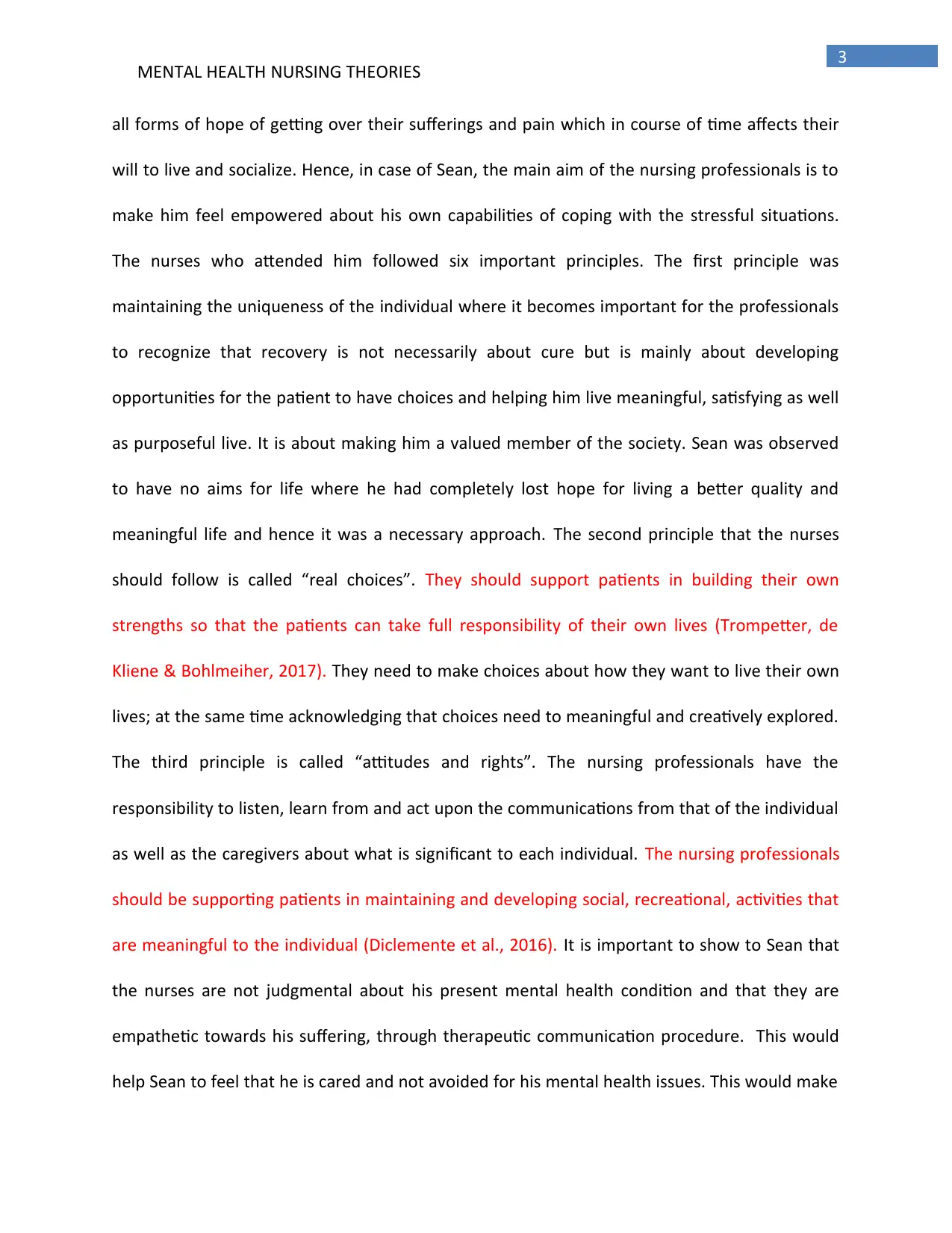
3
MENTAL HEALTH NURSING THEORIES
all forms of hope of getting over their sufferings and pain which in course of time affects their
will to live and socialize. Hence, in case of Sean, the main aim of the nursing professionals is to
make him feel empowered about his own capabilities of coping with the stressful situations.
The nurses who attended him followed six important principles. The first principle was
maintaining the uniqueness of the individual where it becomes important for the professionals
to recognize that recovery is not necessarily about cure but is mainly about developing
opportunities for the patient to have choices and helping him live meaningful, satisfying as well
as purposeful live. It is about making him a valued member of the society. Sean was observed
to have no aims for life where he had completely lost hope for living a better quality and
meaningful life and hence it was a necessary approach. The second principle that the nurses
should follow is called “real choices”. They should support patients in building their own
strengths so that the patients can take full responsibility of their own lives (Trompetter, de
Kliene & Bohlmeiher, 2017). They need to make choices about how they want to live their own
lives; at the same time acknowledging that choices need to meaningful and creatively explored.
The third principle is called “attitudes and rights”. The nursing professionals have the
responsibility to listen, learn from and act upon the communications from that of the individual
as well as the caregivers about what is significant to each individual. The nursing professionals
should be supporting patients in maintaining and developing social, recreational, activities that
are meaningful to the individual (Diclemente et al., 2016). It is important to show to Sean that
the nurses are not judgmental about his present mental health condition and that they are
empathetic towards his suffering, through therapeutic communication procedure. This would
help Sean to feel that he is cared and not avoided for his mental health issues. This would make
MENTAL HEALTH NURSING THEORIES
all forms of hope of getting over their sufferings and pain which in course of time affects their
will to live and socialize. Hence, in case of Sean, the main aim of the nursing professionals is to
make him feel empowered about his own capabilities of coping with the stressful situations.
The nurses who attended him followed six important principles. The first principle was
maintaining the uniqueness of the individual where it becomes important for the professionals
to recognize that recovery is not necessarily about cure but is mainly about developing
opportunities for the patient to have choices and helping him live meaningful, satisfying as well
as purposeful live. It is about making him a valued member of the society. Sean was observed
to have no aims for life where he had completely lost hope for living a better quality and
meaningful life and hence it was a necessary approach. The second principle that the nurses
should follow is called “real choices”. They should support patients in building their own
strengths so that the patients can take full responsibility of their own lives (Trompetter, de
Kliene & Bohlmeiher, 2017). They need to make choices about how they want to live their own
lives; at the same time acknowledging that choices need to meaningful and creatively explored.
The third principle is called “attitudes and rights”. The nursing professionals have the
responsibility to listen, learn from and act upon the communications from that of the individual
as well as the caregivers about what is significant to each individual. The nursing professionals
should be supporting patients in maintaining and developing social, recreational, activities that
are meaningful to the individual (Diclemente et al., 2016). It is important to show to Sean that
the nurses are not judgmental about his present mental health condition and that they are
empathetic towards his suffering, through therapeutic communication procedure. This would
help Sean to feel that he is cared and not avoided for his mental health issues. This would make
Paraphrase This Document
Need a fresh take? Get an instant paraphrase of this document with our AI Paraphraser
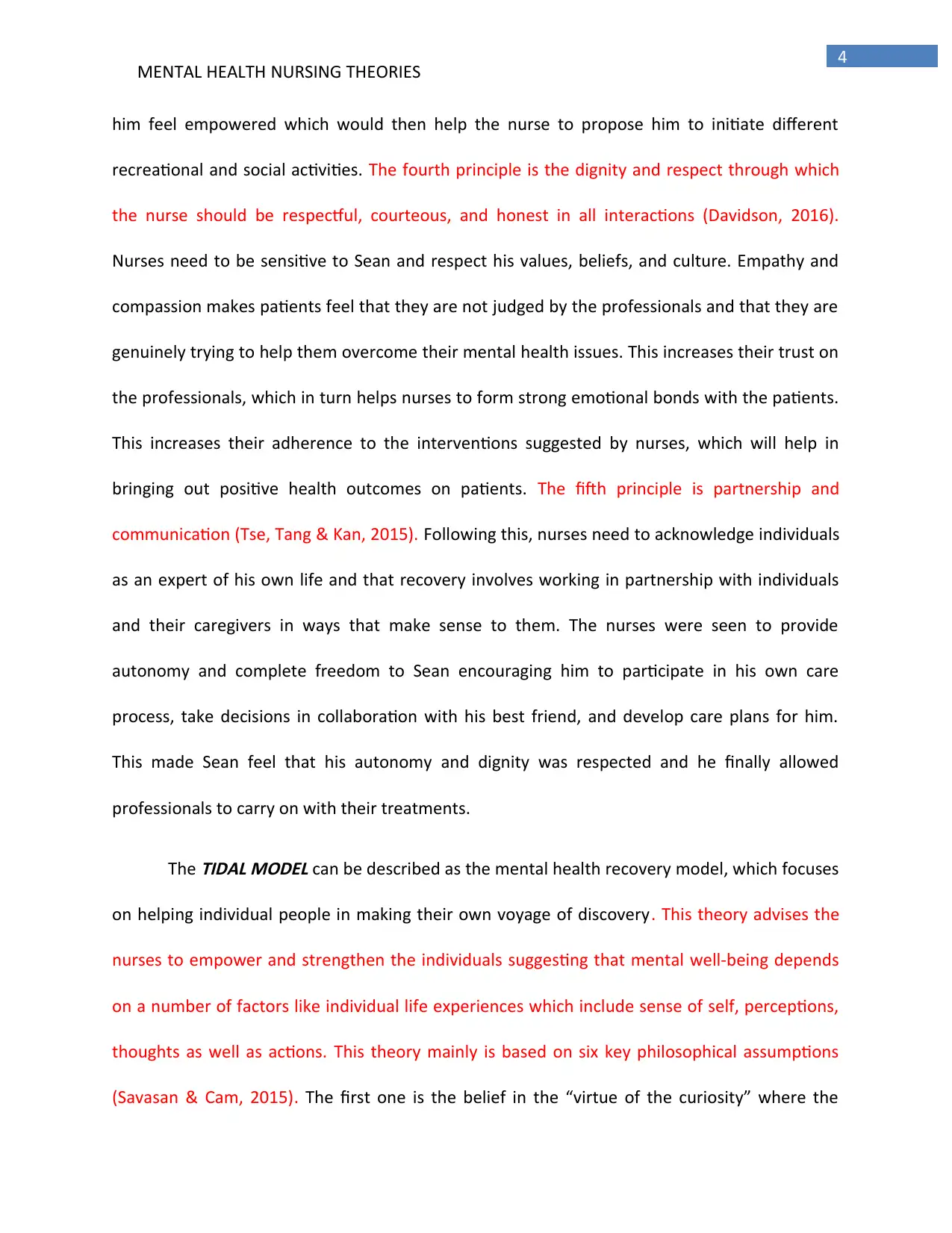
4
MENTAL HEALTH NURSING THEORIES
him feel empowered which would then help the nurse to propose him to initiate different
recreational and social activities. The fourth principle is the dignity and respect through which
the nurse should be respectful, courteous, and honest in all interactions (Davidson, 2016).
Nurses need to be sensitive to Sean and respect his values, beliefs, and culture. Empathy and
compassion makes patients feel that they are not judged by the professionals and that they are
genuinely trying to help them overcome their mental health issues. This increases their trust on
the professionals, which in turn helps nurses to form strong emotional bonds with the patients.
This increases their adherence to the interventions suggested by nurses, which will help in
bringing out positive health outcomes on patients. The fifth principle is partnership and
communication (Tse, Tang & Kan, 2015). Following this, nurses need to acknowledge individuals
as an expert of his own life and that recovery involves working in partnership with individuals
and their caregivers in ways that make sense to them. The nurses were seen to provide
autonomy and complete freedom to Sean encouraging him to participate in his own care
process, take decisions in collaboration with his best friend, and develop care plans for him.
This made Sean feel that his autonomy and dignity was respected and he finally allowed
professionals to carry on with their treatments.
The
TIDAL MODEL can be described as the mental health recovery model, which focuses
on helping individual people in making their own voyage of discovery. This theory advises the
nurses to empower and strengthen the individuals suggesting that mental well-being depends
on a number of factors like individual life experiences which include sense of self, perceptions,
thoughts as well as actions. This theory mainly is based on six key philosophical assumptions
(Savasan & Cam, 2015). The first one is the belief in the “virtue of the curiosity” where the
MENTAL HEALTH NURSING THEORIES
him feel empowered which would then help the nurse to propose him to initiate different
recreational and social activities. The fourth principle is the dignity and respect through which
the nurse should be respectful, courteous, and honest in all interactions (Davidson, 2016).
Nurses need to be sensitive to Sean and respect his values, beliefs, and culture. Empathy and
compassion makes patients feel that they are not judged by the professionals and that they are
genuinely trying to help them overcome their mental health issues. This increases their trust on
the professionals, which in turn helps nurses to form strong emotional bonds with the patients.
This increases their adherence to the interventions suggested by nurses, which will help in
bringing out positive health outcomes on patients. The fifth principle is partnership and
communication (Tse, Tang & Kan, 2015). Following this, nurses need to acknowledge individuals
as an expert of his own life and that recovery involves working in partnership with individuals
and their caregivers in ways that make sense to them. The nurses were seen to provide
autonomy and complete freedom to Sean encouraging him to participate in his own care
process, take decisions in collaboration with his best friend, and develop care plans for him.
This made Sean feel that his autonomy and dignity was respected and he finally allowed
professionals to carry on with their treatments.
The
TIDAL MODEL can be described as the mental health recovery model, which focuses
on helping individual people in making their own voyage of discovery. This theory advises the
nurses to empower and strengthen the individuals suggesting that mental well-being depends
on a number of factors like individual life experiences which include sense of self, perceptions,
thoughts as well as actions. This theory mainly is based on six key philosophical assumptions
(Savasan & Cam, 2015). The first one is the belief in the “virtue of the curiosity” where the
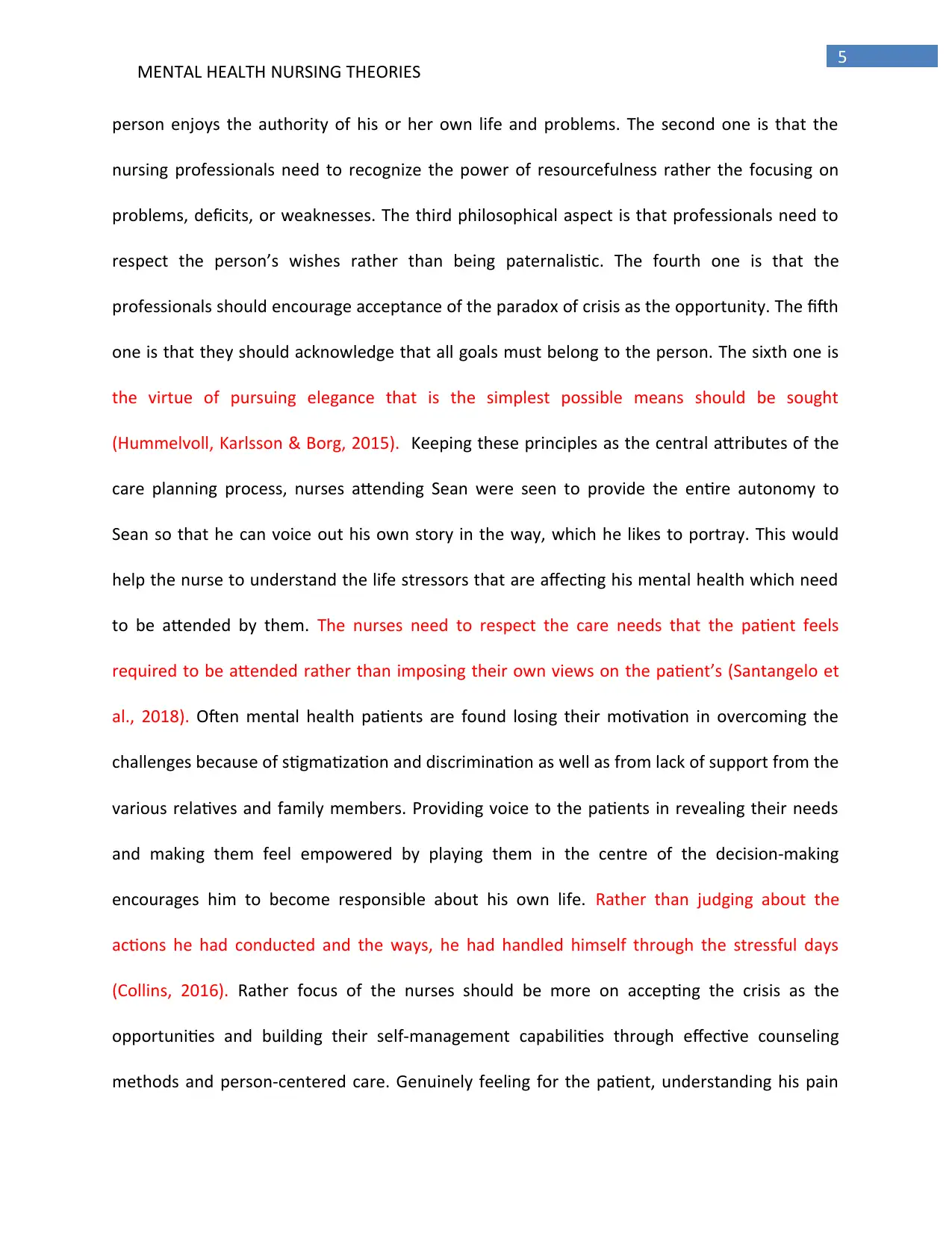
5
MENTAL HEALTH NURSING THEORIES
person enjoys the authority of his or her own life and problems. The second one is that the
nursing professionals need to recognize the power of resourcefulness rather the focusing on
problems, deficits, or weaknesses. The third philosophical aspect is that professionals need to
respect the person’s wishes rather than being paternalistic. The fourth one is that the
professionals should encourage acceptance of the paradox of crisis as the opportunity. The fifth
one is that they should acknowledge that all goals must belong to the person. The sixth one is
the virtue of pursuing elegance that is the simplest possible means should be sought
(Hummelvoll, Karlsson & Borg, 2015). Keeping these principles as the central attributes of the
care planning process, nurses attending Sean were seen to provide the entire autonomy to
Sean so that he can voice out his own story in the way, which he likes to portray. This would
help the nurse to understand the life stressors that are affecting his mental health which need
to be attended by them. The nurses need to respect the care needs that the patient feels
required to be attended rather than imposing their own views on the patient’s (Santangelo et
al., 2018). Often mental health patients are found losing their motivation in overcoming the
challenges because of stigmatization and discrimination as well as from lack of support from the
various relatives and family members. Providing voice to the patients in revealing their needs
and making them feel empowered by playing them in the centre of the decision-making
encourages him to become responsible about his own life. Rather than judging about the
actions he had conducted and the ways, he had handled himself through the stressful days
(Collins, 2016). Rather focus of the nurses should be more on accepting the crisis as the
opportunities and building their self-management capabilities through effective counseling
methods and person-centered care. Genuinely feeling for the patient, understanding his pain
MENTAL HEALTH NURSING THEORIES
person enjoys the authority of his or her own life and problems. The second one is that the
nursing professionals need to recognize the power of resourcefulness rather the focusing on
problems, deficits, or weaknesses. The third philosophical aspect is that professionals need to
respect the person’s wishes rather than being paternalistic. The fourth one is that the
professionals should encourage acceptance of the paradox of crisis as the opportunity. The fifth
one is that they should acknowledge that all goals must belong to the person. The sixth one is
the virtue of pursuing elegance that is the simplest possible means should be sought
(Hummelvoll, Karlsson & Borg, 2015). Keeping these principles as the central attributes of the
care planning process, nurses attending Sean were seen to provide the entire autonomy to
Sean so that he can voice out his own story in the way, which he likes to portray. This would
help the nurse to understand the life stressors that are affecting his mental health which need
to be attended by them. The nurses need to respect the care needs that the patient feels
required to be attended rather than imposing their own views on the patient’s (Santangelo et
al., 2018). Often mental health patients are found losing their motivation in overcoming the
challenges because of stigmatization and discrimination as well as from lack of support from the
various relatives and family members. Providing voice to the patients in revealing their needs
and making them feel empowered by playing them in the centre of the decision-making
encourages him to become responsible about his own life. Rather than judging about the
actions he had conducted and the ways, he had handled himself through the stressful days
(Collins, 2016). Rather focus of the nurses should be more on accepting the crisis as the
opportunities and building their self-management capabilities through effective counseling
methods and person-centered care. Genuinely feeling for the patient, understanding his pain
⊘ This is a preview!⊘
Do you want full access?
Subscribe today to unlock all pages.

Trusted by 1+ million students worldwide
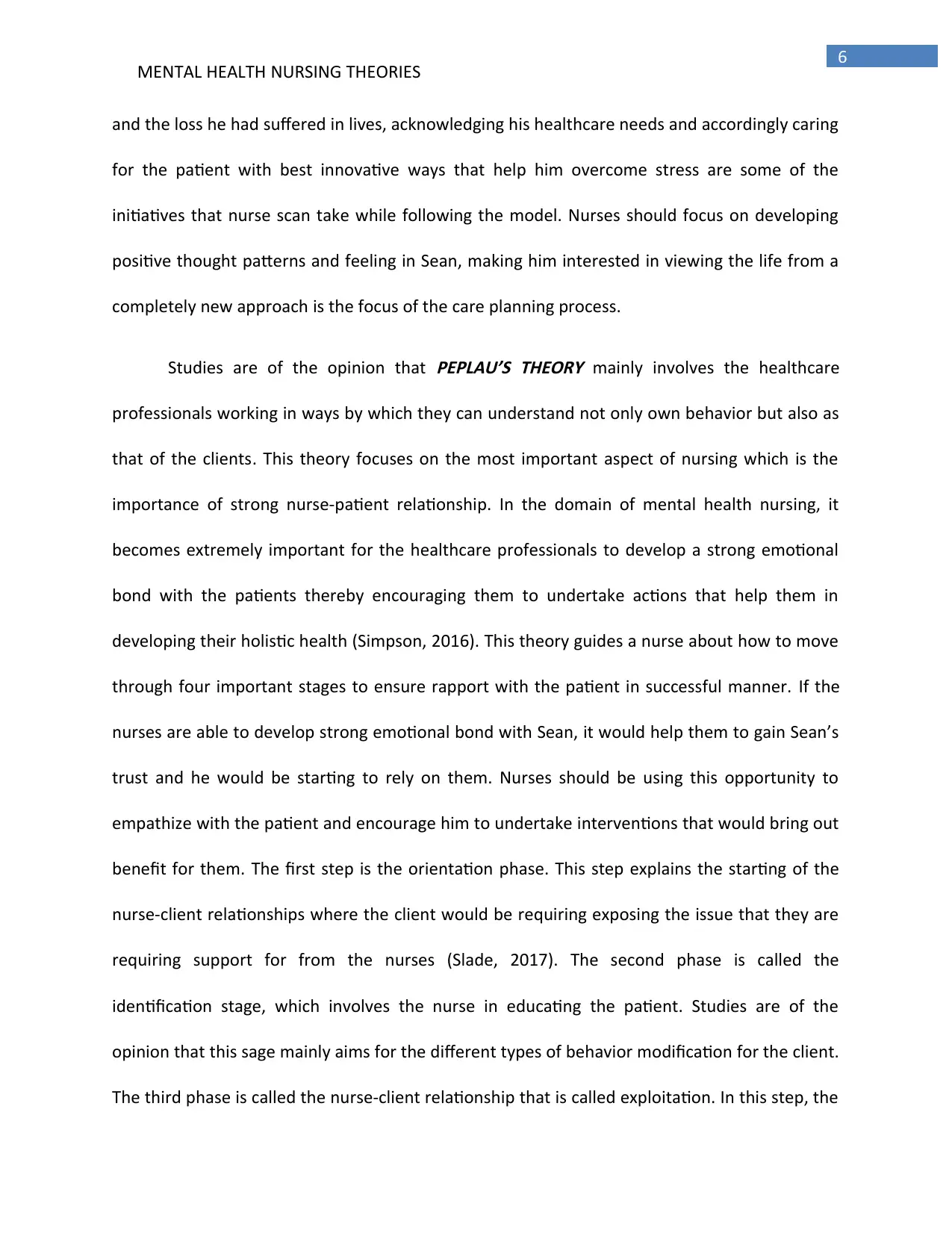
6
MENTAL HEALTH NURSING THEORIES
and the loss he had suffered in lives, acknowledging his healthcare needs and accordingly caring
for the patient with best innovative ways that help him overcome stress are some of the
initiatives that nurse scan take while following the model. Nurses should focus on developing
positive thought patterns and feeling in Sean, making him interested in viewing the life from a
completely new approach is the focus of the care planning process.
Studies are of the opinion that
PEPLAU’S THEORY mainly involves the healthcare
professionals working in ways by which they can understand not only own behavior but also as
that of the clients. This theory focuses on the most important aspect of nursing which is the
importance of strong nurse-patient relationship. In the domain of mental health nursing, it
becomes extremely important for the healthcare professionals to develop a strong emotional
bond with the patients thereby encouraging them to undertake actions that help them in
developing their holistic health (Simpson, 2016). This theory guides a nurse about how to move
through four important stages to ensure rapport with the patient in successful manner. If the
nurses are able to develop strong emotional bond with Sean, it would help them to gain Sean’s
trust and he would be starting to rely on them. Nurses should be using this opportunity to
empathize with the patient and encourage him to undertake interventions that would bring out
benefit for them. The first step is the orientation phase. This step explains the starting of the
nurse-client relationships where the client would be requiring exposing the issue that they are
requiring support for from the nurses (Slade, 2017). The second phase is called the
identification stage, which involves the nurse in educating the patient. Studies are of the
opinion that this sage mainly aims for the different types of behavior modification for the client.
The third phase is called the nurse-client relationship that is called exploitation. In this step, the
MENTAL HEALTH NURSING THEORIES
and the loss he had suffered in lives, acknowledging his healthcare needs and accordingly caring
for the patient with best innovative ways that help him overcome stress are some of the
initiatives that nurse scan take while following the model. Nurses should focus on developing
positive thought patterns and feeling in Sean, making him interested in viewing the life from a
completely new approach is the focus of the care planning process.
Studies are of the opinion that
PEPLAU’S THEORY mainly involves the healthcare
professionals working in ways by which they can understand not only own behavior but also as
that of the clients. This theory focuses on the most important aspect of nursing which is the
importance of strong nurse-patient relationship. In the domain of mental health nursing, it
becomes extremely important for the healthcare professionals to develop a strong emotional
bond with the patients thereby encouraging them to undertake actions that help them in
developing their holistic health (Simpson, 2016). This theory guides a nurse about how to move
through four important stages to ensure rapport with the patient in successful manner. If the
nurses are able to develop strong emotional bond with Sean, it would help them to gain Sean’s
trust and he would be starting to rely on them. Nurses should be using this opportunity to
empathize with the patient and encourage him to undertake interventions that would bring out
benefit for them. The first step is the orientation phase. This step explains the starting of the
nurse-client relationships where the client would be requiring exposing the issue that they are
requiring support for from the nurses (Slade, 2017). The second phase is called the
identification stage, which involves the nurse in educating the patient. Studies are of the
opinion that this sage mainly aims for the different types of behavior modification for the client.
The third phase is called the nurse-client relationship that is called exploitation. In this step, the
Paraphrase This Document
Need a fresh take? Get an instant paraphrase of this document with our AI Paraphraser
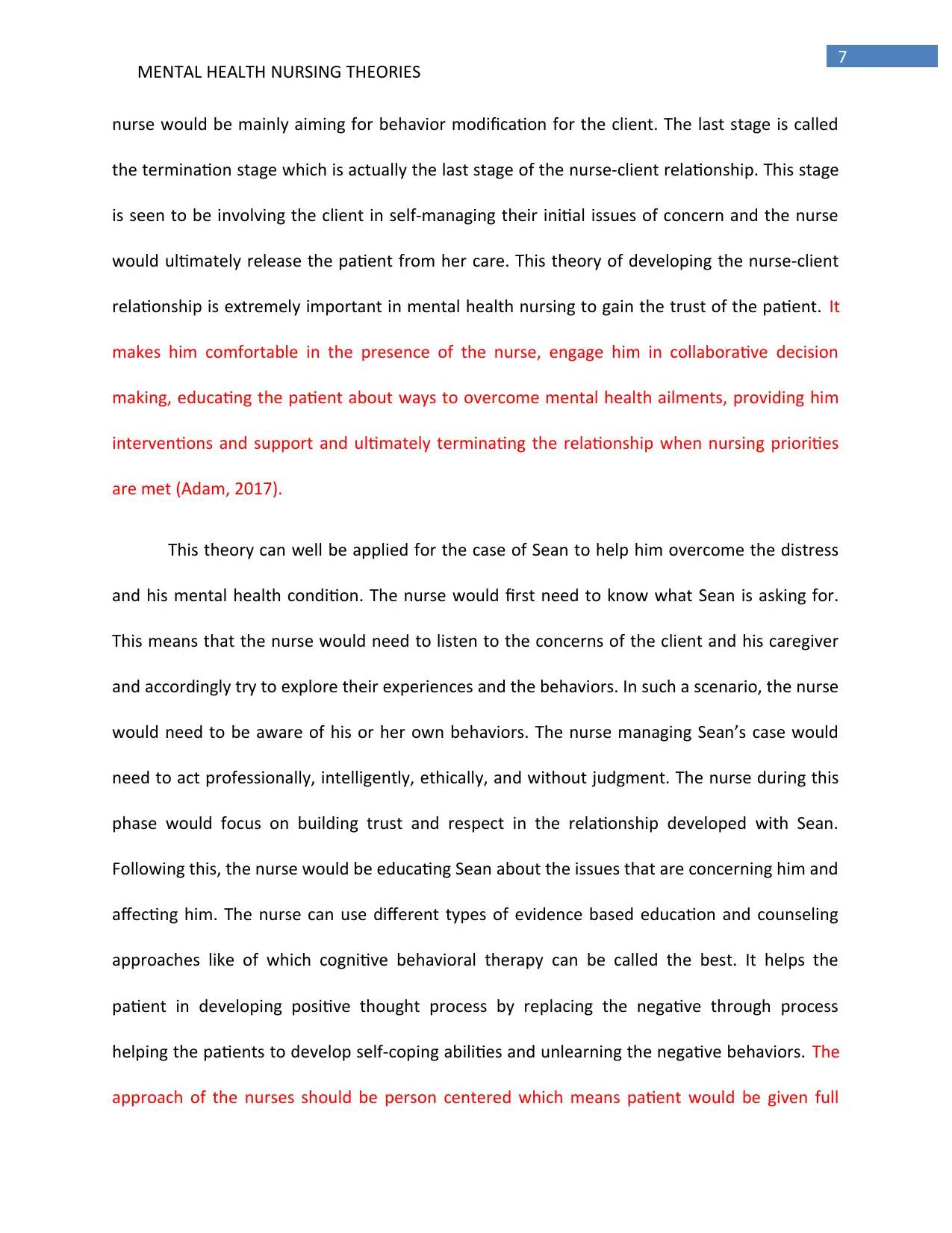
7
MENTAL HEALTH NURSING THEORIES
nurse would be mainly aiming for behavior modification for the client. The last stage is called
the termination stage which is actually the last stage of the nurse-client relationship. This stage
is seen to be involving the client in self-managing their initial issues of concern and the nurse
would ultimately release the patient from her care. This theory of developing the nurse-client
relationship is extremely important in mental health nursing to gain the trust of the patient. It
makes him comfortable in the presence of the nurse, engage him in collaborative decision
making, educating the patient about ways to overcome mental health ailments, providing him
interventions and support and ultimately terminating the relationship when nursing priorities
are met (Adam, 2017).
This theory can well be applied for the case of Sean to help him overcome the distress
and his mental health condition. The nurse would first need to know what Sean is asking for.
This means that the nurse would need to listen to the concerns of the client and his caregiver
and accordingly try to explore their experiences and the behaviors. In such a scenario, the nurse
would need to be aware of his or her own behaviors. The nurse managing Sean’s case would
need to act professionally, intelligently, ethically, and without judgment. The nurse during this
phase would focus on building trust and respect in the relationship developed with Sean.
Following this, the nurse would be educating Sean about the issues that are concerning him and
affecting him. The nurse can use different types of evidence based education and counseling
approaches like of which cognitive behavioral therapy can be called the best. It helps the
patient in developing positive thought process by replacing the negative through process
helping the patients to develop self-coping abilities and unlearning the negative behaviors. The
approach of the nurses should be person centered which means patient would be given full
MENTAL HEALTH NURSING THEORIES
nurse would be mainly aiming for behavior modification for the client. The last stage is called
the termination stage which is actually the last stage of the nurse-client relationship. This stage
is seen to be involving the client in self-managing their initial issues of concern and the nurse
would ultimately release the patient from her care. This theory of developing the nurse-client
relationship is extremely important in mental health nursing to gain the trust of the patient. It
makes him comfortable in the presence of the nurse, engage him in collaborative decision
making, educating the patient about ways to overcome mental health ailments, providing him
interventions and support and ultimately terminating the relationship when nursing priorities
are met (Adam, 2017).
This theory can well be applied for the case of Sean to help him overcome the distress
and his mental health condition. The nurse would first need to know what Sean is asking for.
This means that the nurse would need to listen to the concerns of the client and his caregiver
and accordingly try to explore their experiences and the behaviors. In such a scenario, the nurse
would need to be aware of his or her own behaviors. The nurse managing Sean’s case would
need to act professionally, intelligently, ethically, and without judgment. The nurse during this
phase would focus on building trust and respect in the relationship developed with Sean.
Following this, the nurse would be educating Sean about the issues that are concerning him and
affecting him. The nurse can use different types of evidence based education and counseling
approaches like of which cognitive behavioral therapy can be called the best. It helps the
patient in developing positive thought process by replacing the negative through process
helping the patients to develop self-coping abilities and unlearning the negative behaviors. The
approach of the nurses should be person centered which means patient would be given full
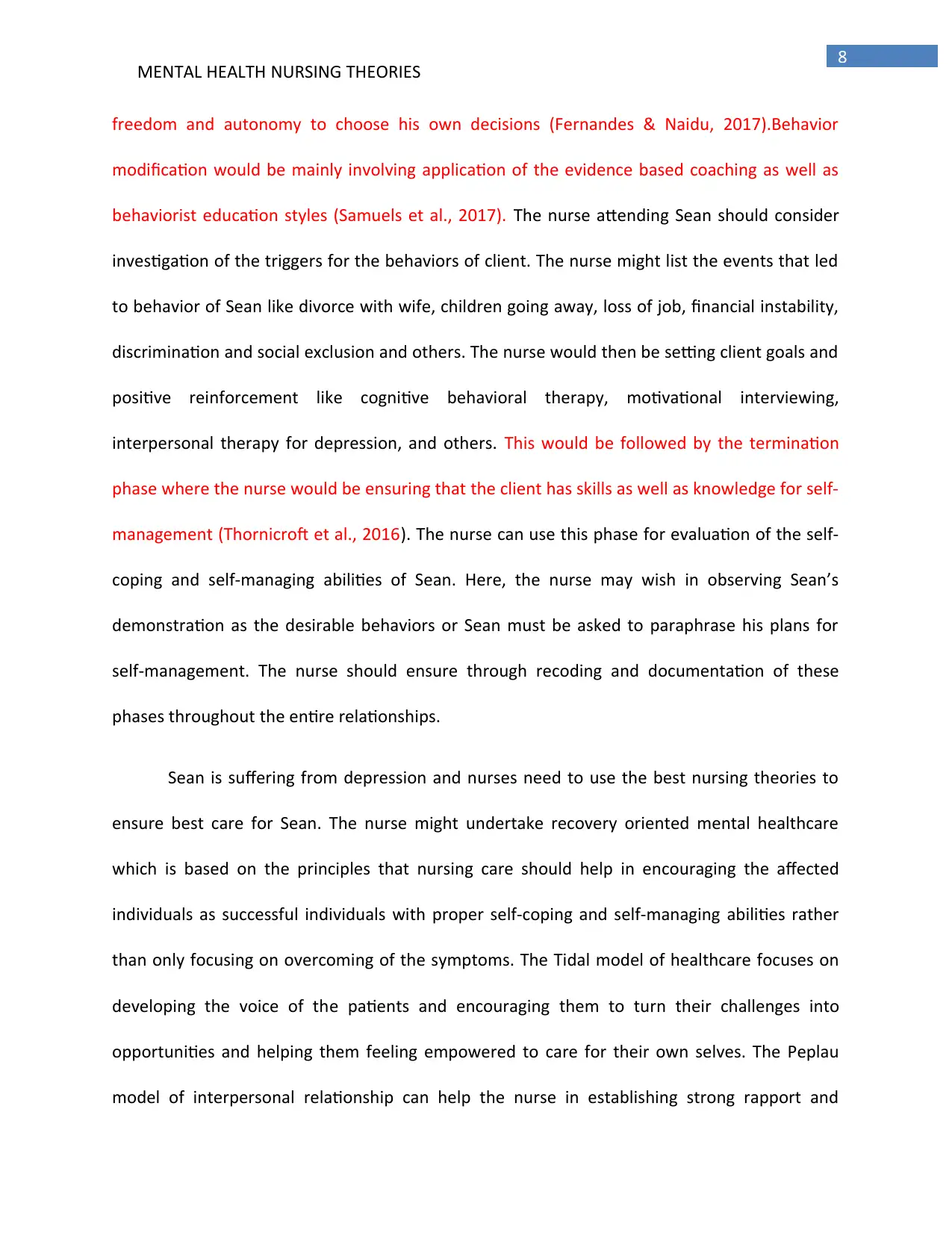
8
MENTAL HEALTH NURSING THEORIES
freedom and autonomy to choose his own decisions (Fernandes & Naidu, 2017).Behavior
modification would be mainly involving application of the evidence based coaching as well as
behaviorist education styles (Samuels et al., 2017). The nurse attending Sean should consider
investigation of the triggers for the behaviors of client. The nurse might list the events that led
to behavior of Sean like divorce with wife, children going away, loss of job, financial instability,
discrimination and social exclusion and others. The nurse would then be setting client goals and
positive reinforcement like cognitive behavioral therapy, motivational interviewing,
interpersonal therapy for depression, and others. This would be followed by the termination
phase where the nurse would be ensuring that the client has skills as well as knowledge for self-
management (Thornicroft et al., 2016). The nurse can use this phase for evaluation of the self-
coping and self-managing abilities of Sean. Here, the nurse may wish in observing Sean’s
demonstration as the desirable behaviors or Sean must be asked to paraphrase his plans for
self-management. The nurse should ensure through recoding and documentation of these
phases throughout the entire relationships.
Sean is suffering from depression and nurses need to use the best nursing theories to
ensure best care for Sean. The nurse might undertake recovery oriented mental healthcare
which is based on the principles that nursing care should help in encouraging the affected
individuals as successful individuals with proper self-coping and self-managing abilities rather
than only focusing on overcoming of the symptoms. The Tidal model of healthcare focuses on
developing the voice of the patients and encouraging them to turn their challenges into
opportunities and helping them feeling empowered to care for their own selves. The Peplau
model of interpersonal relationship can help the nurse in establishing strong rapport and
MENTAL HEALTH NURSING THEORIES
freedom and autonomy to choose his own decisions (Fernandes & Naidu, 2017).Behavior
modification would be mainly involving application of the evidence based coaching as well as
behaviorist education styles (Samuels et al., 2017). The nurse attending Sean should consider
investigation of the triggers for the behaviors of client. The nurse might list the events that led
to behavior of Sean like divorce with wife, children going away, loss of job, financial instability,
discrimination and social exclusion and others. The nurse would then be setting client goals and
positive reinforcement like cognitive behavioral therapy, motivational interviewing,
interpersonal therapy for depression, and others. This would be followed by the termination
phase where the nurse would be ensuring that the client has skills as well as knowledge for self-
management (Thornicroft et al., 2016). The nurse can use this phase for evaluation of the self-
coping and self-managing abilities of Sean. Here, the nurse may wish in observing Sean’s
demonstration as the desirable behaviors or Sean must be asked to paraphrase his plans for
self-management. The nurse should ensure through recoding and documentation of these
phases throughout the entire relationships.
Sean is suffering from depression and nurses need to use the best nursing theories to
ensure best care for Sean. The nurse might undertake recovery oriented mental healthcare
which is based on the principles that nursing care should help in encouraging the affected
individuals as successful individuals with proper self-coping and self-managing abilities rather
than only focusing on overcoming of the symptoms. The Tidal model of healthcare focuses on
developing the voice of the patients and encouraging them to turn their challenges into
opportunities and helping them feeling empowered to care for their own selves. The Peplau
model of interpersonal relationship can help the nurse in establishing strong rapport and
⊘ This is a preview!⊘
Do you want full access?
Subscribe today to unlock all pages.

Trusted by 1+ million students worldwide

9
MENTAL HEALTH NURSING THEORIES
relationship with patient, based on trust and mutual respect and accordingly educates and
provide interventions that bring out best benefits.
MENTAL HEALTH NURSING THEORIES
relationship with patient, based on trust and mutual respect and accordingly educates and
provide interventions that bring out best benefits.
Paraphrase This Document
Need a fresh take? Get an instant paraphrase of this document with our AI Paraphraser
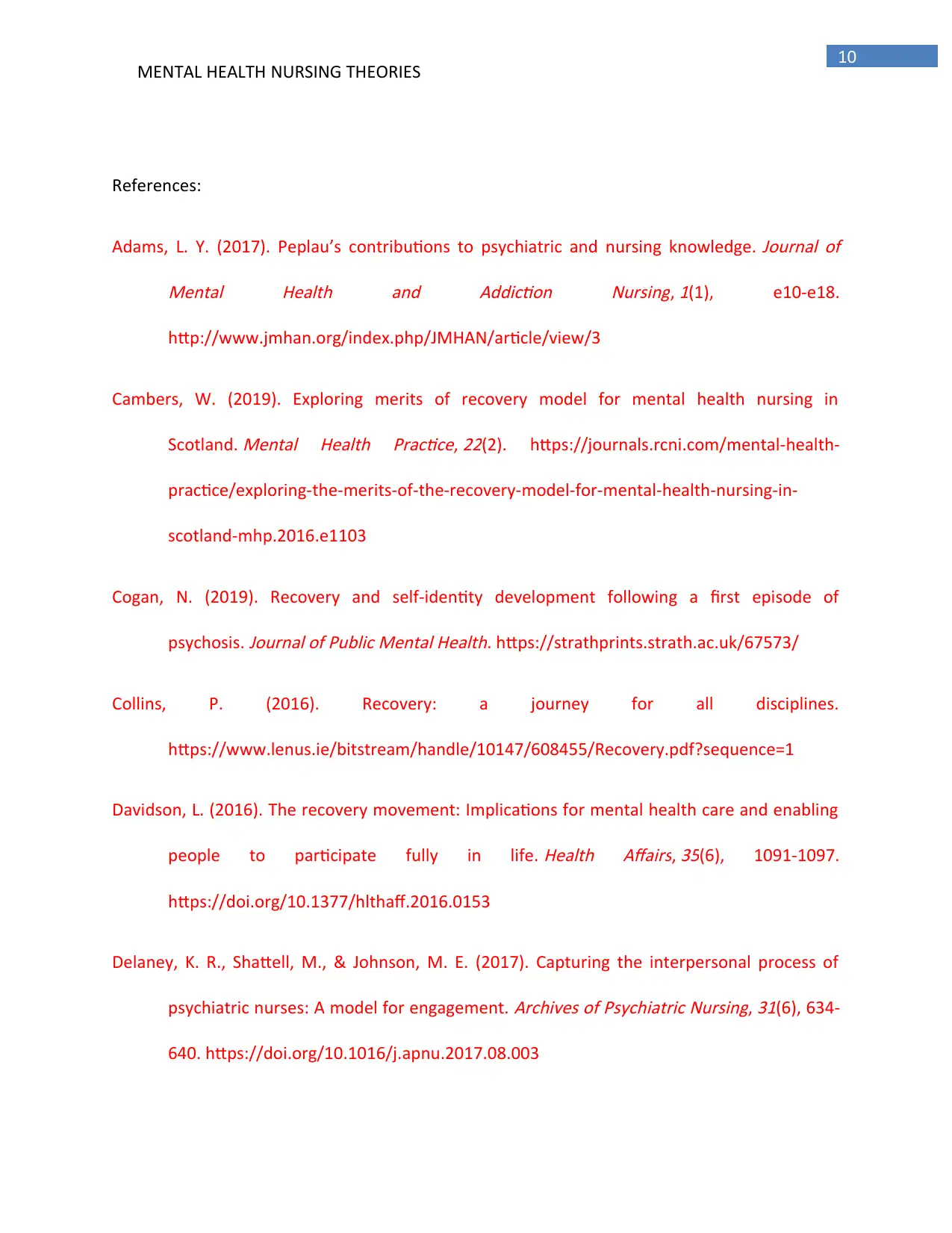
10
MENTAL HEALTH NURSING THEORIES
References:
Adams, L. Y. (2017). Peplau’s contributions to psychiatric and nursing knowledge.
Journal of
Mental Health and Addiction Nursing,
1(1), e10-e18.
http://www.jmhan.org/index.php/JMHAN/article/view/3
Cambers, W. (2019). Exploring merits of recovery model for mental health nursing in
Scotland.
Mental Health Practice,
22(2). https://journals.rcni.com/mental-health-
practice/exploring-the-merits-of-the-recovery-model-for-mental-health-nursing-in-
scotland-mhp.2016.e1103
Cogan, N. (2019). Recovery and self-identity development following a first episode of
psychosis.
Journal of Public Mental Health. https://strathprints.strath.ac.uk/67573/
Collins, P. (2016). Recovery: a journey for all disciplines.
https://www.lenus.ie/bitstream/handle/10147/608455/Recovery.pdf?sequence=1
Davidson, L. (2016). The recovery movement: Implications for mental health care and enabling
people to participate fully in life.
Health Affairs,
35(6), 1091-1097.
https://doi.org/10.1377/hlthaff.2016.0153
Delaney, K. R., Shattell, M., & Johnson, M. E. (2017). Capturing the interpersonal process of
psychiatric nurses: A model for engagement.
Archives of Psychiatric Nursing,
31(6), 634-
640. https://doi.org/10.1016/j.apnu.2017.08.003
MENTAL HEALTH NURSING THEORIES
References:
Adams, L. Y. (2017). Peplau’s contributions to psychiatric and nursing knowledge.
Journal of
Mental Health and Addiction Nursing,
1(1), e10-e18.
http://www.jmhan.org/index.php/JMHAN/article/view/3
Cambers, W. (2019). Exploring merits of recovery model for mental health nursing in
Scotland.
Mental Health Practice,
22(2). https://journals.rcni.com/mental-health-
practice/exploring-the-merits-of-the-recovery-model-for-mental-health-nursing-in-
scotland-mhp.2016.e1103
Cogan, N. (2019). Recovery and self-identity development following a first episode of
psychosis.
Journal of Public Mental Health. https://strathprints.strath.ac.uk/67573/
Collins, P. (2016). Recovery: a journey for all disciplines.
https://www.lenus.ie/bitstream/handle/10147/608455/Recovery.pdf?sequence=1
Davidson, L. (2016). The recovery movement: Implications for mental health care and enabling
people to participate fully in life.
Health Affairs,
35(6), 1091-1097.
https://doi.org/10.1377/hlthaff.2016.0153
Delaney, K. R., Shattell, M., & Johnson, M. E. (2017). Capturing the interpersonal process of
psychiatric nurses: A model for engagement.
Archives of Psychiatric Nursing,
31(6), 634-
640. https://doi.org/10.1016/j.apnu.2017.08.003
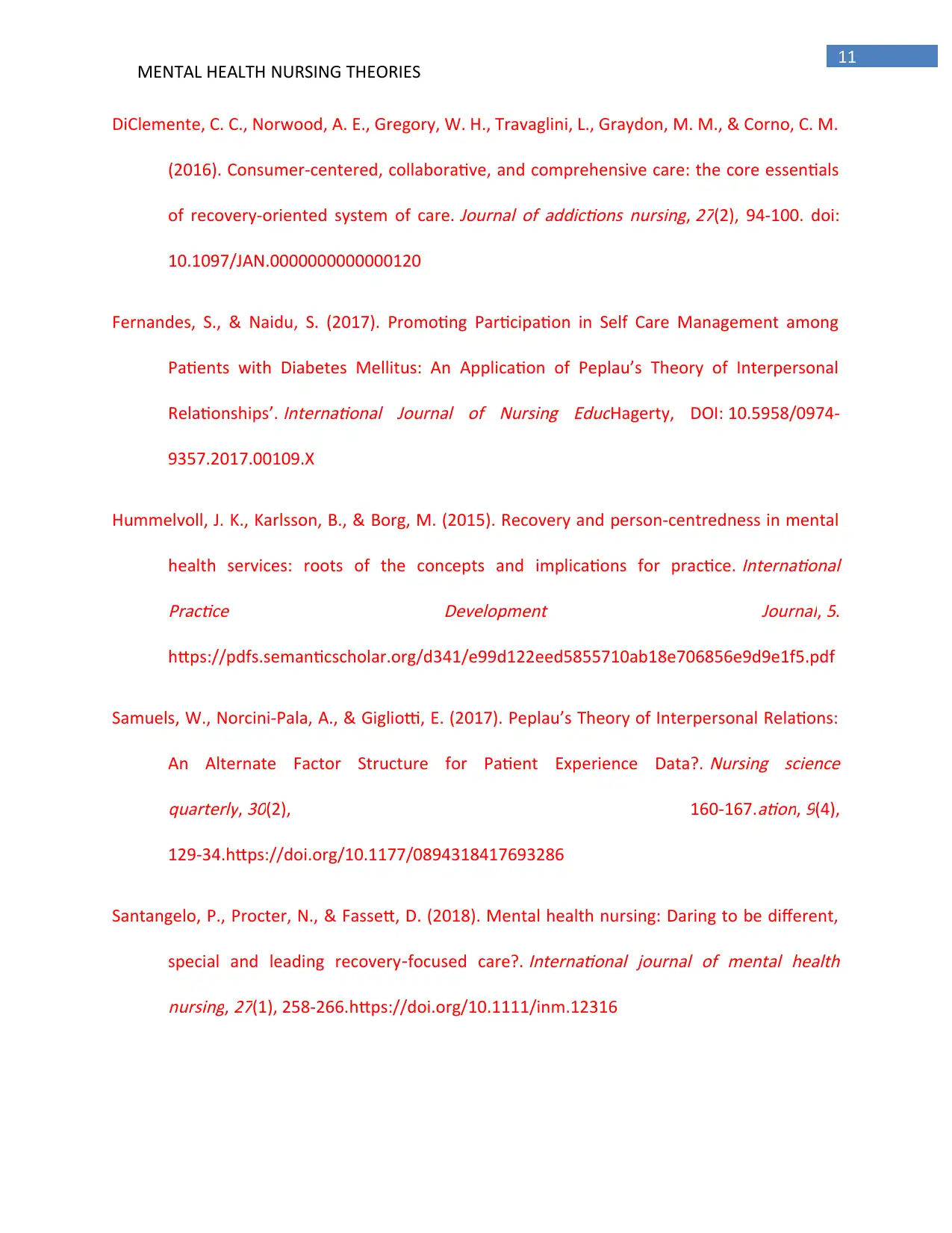
11
MENTAL HEALTH NURSING THEORIES
DiClemente, C. C., Norwood, A. E., Gregory, W. H., Travaglini, L., Graydon, M. M., & Corno, C. M.
(2016). Consumer-centered, collaborative, and comprehensive care: the core essentials
of recovery-oriented system of care.
Journal of addictions nursing,
27(2), 94-100. doi:
10.1097/JAN.0000000000000120
Fernandes, S., & Naidu, S. (2017). Promoting Participation in Self Care Management among
Patients with Diabetes Mellitus: An Application of Peplau’s Theory of Interpersonal
Relationships’.
International Journal of Nursing EducHagerty, DOI: 10.5958/0974-
9357.2017.00109.X
Hummelvoll, J. K., Karlsson, B., & Borg, M. (2015). Recovery and person-centredness in mental
health services: roots of the concepts and implications for practice.
International
Practice
Development
Journal,
5.
https://pdfs.semanticscholar.org/d341/e99d122eed5855710ab18e706856e9d9e1f5.pdf
Samuels, W., Norcini-Pala, A., & Gigliotti, E. (2017). Peplau’s Theory of Interpersonal Relations:
An Alternate Factor Structure for Patient Experience Data?.
Nursing science
quarterly,
30(2), 160-167.
ation,
9(4),
129-34.https://doi.org/10.1177/0894318417693286
Santangelo, P., Procter, N., & Fassett, D. (2018). Mental health nursing: Daring to be different,
special and leading recovery‐focused care?.
International journal of mental health
nursing,
27(1), 258-266.https://doi.org/10.1111/inm.12316
MENTAL HEALTH NURSING THEORIES
DiClemente, C. C., Norwood, A. E., Gregory, W. H., Travaglini, L., Graydon, M. M., & Corno, C. M.
(2016). Consumer-centered, collaborative, and comprehensive care: the core essentials
of recovery-oriented system of care.
Journal of addictions nursing,
27(2), 94-100. doi:
10.1097/JAN.0000000000000120
Fernandes, S., & Naidu, S. (2017). Promoting Participation in Self Care Management among
Patients with Diabetes Mellitus: An Application of Peplau’s Theory of Interpersonal
Relationships’.
International Journal of Nursing EducHagerty, DOI: 10.5958/0974-
9357.2017.00109.X
Hummelvoll, J. K., Karlsson, B., & Borg, M. (2015). Recovery and person-centredness in mental
health services: roots of the concepts and implications for practice.
International
Practice
Development
Journal,
5.
https://pdfs.semanticscholar.org/d341/e99d122eed5855710ab18e706856e9d9e1f5.pdf
Samuels, W., Norcini-Pala, A., & Gigliotti, E. (2017). Peplau’s Theory of Interpersonal Relations:
An Alternate Factor Structure for Patient Experience Data?.
Nursing science
quarterly,
30(2), 160-167.
ation,
9(4),
129-34.https://doi.org/10.1177/0894318417693286
Santangelo, P., Procter, N., & Fassett, D. (2018). Mental health nursing: Daring to be different,
special and leading recovery‐focused care?.
International journal of mental health
nursing,
27(1), 258-266.https://doi.org/10.1111/inm.12316
⊘ This is a preview!⊘
Do you want full access?
Subscribe today to unlock all pages.

Trusted by 1+ million students worldwide
1 out of 14
Related Documents
Your All-in-One AI-Powered Toolkit for Academic Success.
+13062052269
info@desklib.com
Available 24*7 on WhatsApp / Email
![[object Object]](/_next/static/media/star-bottom.7253800d.svg)
Unlock your academic potential
Copyright © 2020–2026 A2Z Services. All Rights Reserved. Developed and managed by ZUCOL.





